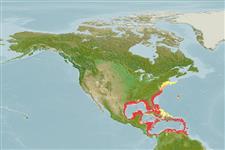>
Eupercaria/misc (Various families in series Eupercaria) >
Lutjanidae (Snappers) > Lutjaninae
Etymology: Lutjanus: Malay, ikan lutjan, name of a fish.
More on author: Linnaeus.
Environment: milieu / climate zone / depth range / distribution range
Sinh thái học
Biển; Nước ngọt; Thuộc về nước lợ Cùng sống ở rạn san hô; sống cả ở nước ngọt và nuớc mặn (Ref. 55); Mức độ sâu 5 - 180 m (Ref. 55), usually ? - 50 m (Ref. 9626). Subtropical; 42°N - 9°N, 98°W - 59°W (Ref. 55231)
Western Atlantic: Massachusetts south along U.S. coast, Bermuda, the Bahamas, and throughout the Gulf of Mexico and Caribbean Sea. Records from Brazil are based on misidentifications (Ref. 113893). Records from the eastern Atlantic are vagrants (Ref. 10795).
Length at first maturity / Bộ gần gũi / Khối lượng (Trọng lượng) / Age
Maturity: Lm 32.0, range 21 - ? cm
Max length : 89.0 cm TL con đực/không giới tính; (Ref. 55); common length : 40.0 cm TL con đực/không giới tính; (Ref. 55); Khối lượng cực đại được công bố: 20.0 kg (Ref. 4883); Tuổi cực đại được báo cáo: 21 các năm (Ref. 55)
Các tia vây lưng cứng (tổng cộng) : 10; Các vây lưng mềm (tổng cộng) : 13 - 14; Tia cứng vây hậu môn: 3; Tia mềm vây hậu môn: 7 - 8. Dorsal profile of head slightly concave, snout long and pointed. Preopercular notch and knob weak. Scale rows on back parallel to lateral line anteriorly, but rising obliquely posteriorly, below soft part of dorsal fin. Young specimens with a dark stripe from snout through the eye to upper opercle and a blue stripe on cheek below eye.
Adults inhabit coastal as well as offshore waters around coral reefs, rocky areas, estuaries, mangrove areas, and sometimes in lower reaches of rivers (especially the young). They are found in fresh water in Florida (Ref. 26938). Often forming large aggregations. Feed mainly at night on small fishes, shrimps, crabs, gastropods, cephalopods and some planktonic items. Easily approached (Ref. 9710). Good food fish (Ref. 9626). Utilized fresh and frozen; eaten pan-fried, broiled, microwaved, and baked (Ref. 9987). Has been reared in captivity (Ref. 35420).
Spawning occurs in summer near the time of the full moon.
Allen, G.R., 1985. FAO Species Catalogue. Vol. 6. Snappers of the world. An annotated and illustrated catalogue of lutjanid species known to date. FAO Fish. Synop. 125(6):208 p. Rome: FAO. (Ref. 55)
IUCN Red List Status (Ref. 130435)
Threat to humans
Reports of ciguatera poisoning (Ref. 31172)
Human uses
Các nghề cá: Tính thương mại; cá để chơi: đúng; Bể nuôi cá: Tính thương mại
Các công cụ
Special reports
Download XML
Các nguồn internet
Estimates based on models
Preferred temperature (Ref.
123201): 20 - 27.5, mean 24.8 °C (based on 137 cells).
Phylogenetic diversity index (Ref.
82804): PD
50 = 0.5000 [Uniqueness, from 0.5 = low to 2.0 = high].
Bayesian length-weight: a=0.01479 (0.01302 - 0.01681), b=2.97 (2.95 - 2.99), in cm total length, based on LWR estimates for this species (Ref.
93245).
Mức dinh dưỡng (Ref.
69278): 4.2 ±0.3 se; based on diet studies.
Generation time: 6.6 (4.8 - 8.8) years. Estimated as median ln(3)/K based on 10
growth studies.
Thích nghi nhanh (Ref.
120179): Trung bình, thời gian nhân đôi của chủng quần tối thiểu là 1.4 - 4.4 năm (K=0.10; tm=2-3; tmax=21).
Prior r = 0.31, 95% CL = 0.20 - 0.46, Based on 1 full stock assessment.
Fishing Vulnerability (Ref.
59153): Moderate vulnerability (41 of 100).
Nutrients (Ref.
124155): Calcium = 14.7 [8.0, 24.0] mg/100g; Iron = 0.307 [0.183, 0.560] mg/100g; Protein = 19.5 [18.0, 20.8] %; Omega3 = 0.222 [0.132, 0.370] g/100g; Selenium = 36.3 [18.3, 68.1] μg/100g; VitaminA = 92.6 [15.6, 438.0] μg/100g; Zinc = 0.255 [0.181, 0.390] mg/100g (wet weight);
